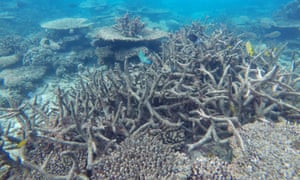Extract from The Guardian
Burdekin, Fitzroy, Tully and Daintree rivers in Queensland pose greatest risk, researchers find
Four rivers are most responsible for polluting the Great Barrier Reef,
according to research that scientists hope will help governments better
target efforts to reduce damage to the reef from land use.
The Burdekin, Fitzroy, Tully and Daintree rivers in Queensland posed the greatest risk to the reef, the study led by The Nature Conservancy and the University of Queensland found.
Scientists used oceanographic models and virtual dyes to trace movements of pollutants through the river system and into the reef during the three wet seasons from 2011 to 2013.
In some cases pollutants were travelling such long distances they were impacting on reefs hundreds of kilometres away.
“One of the big surprises was to discover how much of a reach the Burdekin river has on the Great Barrier Reef,” lead author and Nature Conservancy climate scientist Nick Wolff said.
In 2011, pollution from the Burdekin travelled 450km north of the river mouth and affected 275 reefs.
Wolff said most of the pollution that entered the reef was from fertilisers used in sugar cane and other farming and from land clearing, which increases sediment and nutrient runoff into the reef.
After climate change, poor water quality is the biggest threat to the reef.
When dissolved inorganic nitrogen enters the ocean from runoff, it stimulates the growth of algae, which can smother corals.
Wolff said the research had allowed the scientists to answer a question that had been asked for a long time.
“That is: which rivers were polluting the Great Barrier Reef? Now we can really tie individual reefs to individual rivers.”
He said researchers hoped the study could help land users and parks and resource management workers to talk “more transparently” to each other and governments to focus work on the most polluting catchments.
“We want to get pollution under control because we’re so fearful of climate change. This is one thing we can do in the very near term to build the resilience of the reef,” he said.
The Turnbull government announced a $500m package in April to manage issues on the reef, including water quality and crown of thorns starfish.
But it has come under scrutiny for announcing $444m of that funding will go to the Great Barrier Reef Foundation, a not for profit with six full-time staff.
The foundation was selected for the grant without a tender process.
The Burdekin, Fitzroy, Tully and Daintree rivers in Queensland posed the greatest risk to the reef, the study led by The Nature Conservancy and the University of Queensland found.
Scientists used oceanographic models and virtual dyes to trace movements of pollutants through the river system and into the reef during the three wet seasons from 2011 to 2013.
In some cases pollutants were travelling such long distances they were impacting on reefs hundreds of kilometres away.
“One of the big surprises was to discover how much of a reach the Burdekin river has on the Great Barrier Reef,” lead author and Nature Conservancy climate scientist Nick Wolff said.
In 2011, pollution from the Burdekin travelled 450km north of the river mouth and affected 275 reefs.
Wolff said most of the pollution that entered the reef was from fertilisers used in sugar cane and other farming and from land clearing, which increases sediment and nutrient runoff into the reef.
After climate change, poor water quality is the biggest threat to the reef.
When dissolved inorganic nitrogen enters the ocean from runoff, it stimulates the growth of algae, which can smother corals.
Wolff said the research had allowed the scientists to answer a question that had been asked for a long time.
“That is: which rivers were polluting the Great Barrier Reef? Now we can really tie individual reefs to individual rivers.”
He said researchers hoped the study could help land users and parks and resource management workers to talk “more transparently” to each other and governments to focus work on the most polluting catchments.
“We want to get pollution under control because we’re so fearful of climate change. This is one thing we can do in the very near term to build the resilience of the reef,” he said.
The Turnbull government announced a $500m package in April to manage issues on the reef, including water quality and crown of thorns starfish.
But it has come under scrutiny for announcing $444m of that funding will go to the Great Barrier Reef Foundation, a not for profit with six full-time staff.
The foundation was selected for the grant without a tender process.

No comments:
Post a Comment